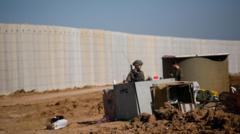The deadline for Israeli forces to exit southern Lebanon passed early on Sunday without a full withdrawal, as authorities cited unfulfilled terms of the ceasefire between Israel and Hezbollah. A ceasefire deal, negotiated by the U.S. and France, was aimed at ending more than a year of hostilities, during which approximately 4,000 people were killed, including civilians, and over 1.2 million were displaced.
While Israel had agreed to withdraw its troops under the 60-day ceasefire, officials stated that the exit was contingent on the Lebanese army’s thorough enforcement of the agreement and Hezbollah's withdrawal from areas near the Litani River, roughly 30 kilometers from Israel's security border. As it stands, thousands of Israeli soldiers remain in Lebanon, awaiting further developments.
Lebanon’s newly elected president, Joseph Aoun, has been under pressure to stabilize the precarious situation in the south amid ongoing consultations regarding Israel's military presence. His office reported “intensive contacts” to address what it deemed “dangerous Israeli practices” in the area. However, any escalation of conflict could trigger widespread backlash from Lebanese citizens who are wary of further violence.
Despite the ceasefire being established in September of the previous year following intense Israeli air raids and ground invasions, the status quo remains fraught with uncertainty. Various local and international observers suggest that Hezbollah’s response to Israel’s delay in withdrawal remains unclear. On Thursday, the group issued a statement condemning Israel's actions as violations of Lebanese sovereignty, yet refrained from outlining its countermeasures should Israeli troops continue their presence.
A Western diplomatic source indicated that Israel requested additional time to dismantle Hezbollah’s military infrastructure before a complete withdrawal could take place. The group itself has been weakened by the sustained conflict, suffering considerable losses among its ranks and facing diminished political power within Lebanon. The last parliamentary elections, held after prolonged political contention largely associated with Hezbollah, resulted in the election of President Aoun, who now aims to implement essential reforms to revive an economy battered by years of crisis.
Support for Hezbollah among Lebanese Shia communities persists, but the group’s reputation has taken a hit due to its involvement in the recent conflict. A renewed wave of violence from Hezbollah could lead to intensified criticism not only from opposition factions but potentially from its own base, who might perceive such actions as detrimental to Lebanon's greater interests.
As Israel maintains its troop presence and Lebanon navigates the complexities of military and political development, the region remains on the brink of uncertainty with the potential for renewed conflict lingering in the shadows.
While Israel had agreed to withdraw its troops under the 60-day ceasefire, officials stated that the exit was contingent on the Lebanese army’s thorough enforcement of the agreement and Hezbollah's withdrawal from areas near the Litani River, roughly 30 kilometers from Israel's security border. As it stands, thousands of Israeli soldiers remain in Lebanon, awaiting further developments.
Lebanon’s newly elected president, Joseph Aoun, has been under pressure to stabilize the precarious situation in the south amid ongoing consultations regarding Israel's military presence. His office reported “intensive contacts” to address what it deemed “dangerous Israeli practices” in the area. However, any escalation of conflict could trigger widespread backlash from Lebanese citizens who are wary of further violence.
Despite the ceasefire being established in September of the previous year following intense Israeli air raids and ground invasions, the status quo remains fraught with uncertainty. Various local and international observers suggest that Hezbollah’s response to Israel’s delay in withdrawal remains unclear. On Thursday, the group issued a statement condemning Israel's actions as violations of Lebanese sovereignty, yet refrained from outlining its countermeasures should Israeli troops continue their presence.
A Western diplomatic source indicated that Israel requested additional time to dismantle Hezbollah’s military infrastructure before a complete withdrawal could take place. The group itself has been weakened by the sustained conflict, suffering considerable losses among its ranks and facing diminished political power within Lebanon. The last parliamentary elections, held after prolonged political contention largely associated with Hezbollah, resulted in the election of President Aoun, who now aims to implement essential reforms to revive an economy battered by years of crisis.
Support for Hezbollah among Lebanese Shia communities persists, but the group’s reputation has taken a hit due to its involvement in the recent conflict. A renewed wave of violence from Hezbollah could lead to intensified criticism not only from opposition factions but potentially from its own base, who might perceive such actions as detrimental to Lebanon's greater interests.
As Israel maintains its troop presence and Lebanon navigates the complexities of military and political development, the region remains on the brink of uncertainty with the potential for renewed conflict lingering in the shadows.













